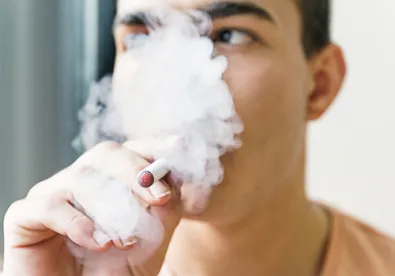As previously reported on this blog, on November 15, 2018, citing new data from the 2018 National Youth Tobacco Survey (NYTS) that showed a surge in e-cigarette use among youth, U.S. Food and Drug Administration (FDA) Commissioner Scott Gottlieb, M.D. announced new steps aimed at curtailing illegal underage use of e-cigarettes by limiting where such products can be purchased. More specifically, the Commissioner indicated that FDA would seek to limit the sale of flavored e-cigarettes (excluding tobacco, mint and menthol flavored products) to (1) brick-and-mortar retailers that permit entry only to adults (18+), or that have a walled-off adult-only section where flavored products can be viewed and purchased; and (2) in online stores that implement soon-to-be-announced “heightened” age-verification measures. [1]
With respect to online sales of flavored e-cigarettes, while FDA has not yet provided direction on how companies should verify the age of those purchasing such products over the internet, FDA said that it plans to identify and publish a list of best practices for online retailers. It is possible that the Agency will implement guidance that includes similar requirements to those found in California’s Stop Tobacco Access to Kids Enforcement Act (STAKE Act) – a law which California authorities are increasingly enforcing.
California’s STAKE Act
California law prohibits the sale of tobacco products to anyone under the age of 21[2], and the STAKE Act imposes mandatory steps that online distributors and sellers of tobacco products are required to follow to verify that a purchaser of these items is 21 years of age or older. The Act defines “tobacco products” to include an “electronic device that delivers nicotine or other vaporized liquids to the person inhaling from the device, including, but not limited to, an electronic cigarette, cigar, pipe, or hookah."[3]
The steps required under the STAKE ACT are summarized below.
- Attempt to match the name, address, and date of birth provided by the customer to information contained in records in a database of individuals whose age has been verified to be 21 years or older by reference to an appropriate database of government records kept by the distributor, a direct marketing firm or any other entity.
- Verify that the billing address on the check or credit card offered for payment by the purchaser matches the address listed in the database.
- If unable to verify that the purchaser is 21 years of age through the above, require the customer or recipient to submit an age-verification kit consisting of an attestation signed by the customer that he or she is 21 years of age or older and a copy of a valid form of government identification.
- Verify that the billing address on the check or credit card provided by the consumer matches the address listed in the form of government identification.
- For credit card transactions, submit information to each credit card company so that the words “tobacco product” may be printed in the purchaser’s credit card statement.
- Regardless of the form of payment, prior to shipping the tobacco product to a California customer, make a telephone call after 5 p.m. to the purchaser or recipient confirming the order. The call may be a recorded message left on voicemail.
- Deliver only to the purchaser or recipient’s verified billing address on the check or credit card used for payment. Delivery to a post office box address is prohibited.[4]
Enforcement of the STAKE Act
California is actively pursuing businesses that violate the STAKE Act, both through warning letters from the state Department of Justice, as well as legal action. The warning letters, which may include violations of additional statutes (e.g., Propositions 56 and 65), outline the obligations to businesses and the requirements that they must to take to ensure that their tobacco products—including electronic cigarettes and vapor devices—are not being sold to anyone under 21 years of age. The letters also remind recipients that:
“Section 22963 [the STAKE Act] provides for civil penalties of up to $2,000 for the first violation of its requirements, $3,500 for the second violation, $5,000 for the third violation, $6,500 for the fourth violation, and $10,000 for each subsequent violation in a five-year period.”
Legal action taken by California includes a lawsuit filed in the Superior Court of the State of California, County of Los Angeles on October 31, 2018, naming Kandypens Inc., a manufacturer and online retailer of vaping products, as the defendant. The enforcement action seeks injunctive relief and civil penalties for violating the STAKE Act, and other statutes.
Noting that “…any child with a prepaid gift card and an internet connection can easily purchase Kandypens’ vaping devices and e-liquids through Kandypens’ website because Defendant fails to follow state-mandated procedures for verifying a purchaser’s age,” the enforcement action requests that Kandypens be enjoined from selling vaping products over the internet without first verifying the purchaser’s age. It also requests that the Defendant be assessed civil penalties for each violation of the STAKE Act, in addition to penalties for violating of other statutes.
While we await FDA’s final guidance for online e-cigarette retailers, businesses selling tobacco products to consumers in California over the internet need to be in compliance with the STAKE Act now. Although it is not yet clear what “heightened” online age-verification measures FDA will require, it is certainly possible that the Agency will turn to states like California for guidance.
______________________________________
[1] U.S. Food & Drug Admin., FDA Statement, Statement From FDA Commissioner Scott Gottlieb, M.D., on Proposed New Steps to Protect Youth by Preventing Access to Flavored Tobacco Products and Banning Menthol in Cigarettes (Nov. 15, 2018) (hereinafter, the “FDA Nov. 15, 2018 Statement”),
[2] Cal. Bus. & Prof. Code § 22958(a).
[3] Cal. Bus. & Prof. Code § 22963(a).
[4] SB 7, amending Cal. Bus. & Prof. Code § 22963.




 />i
/>i
